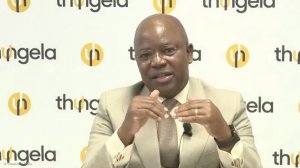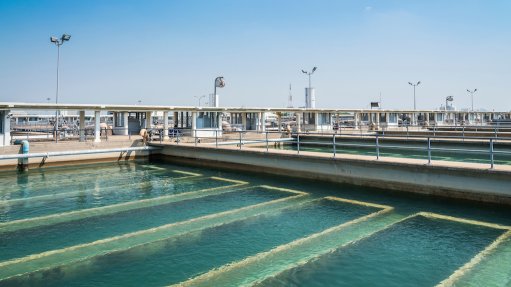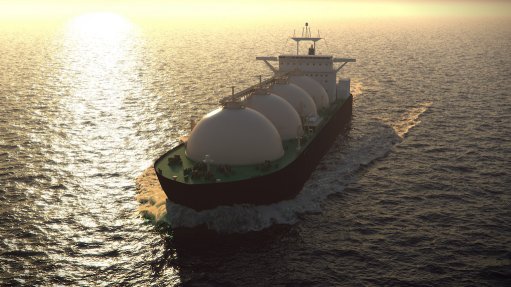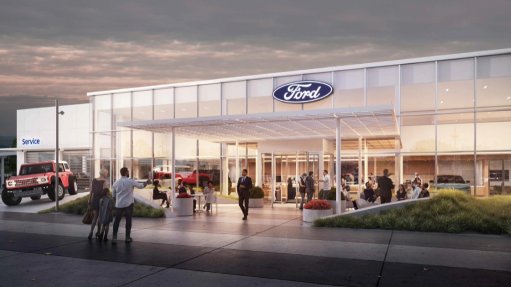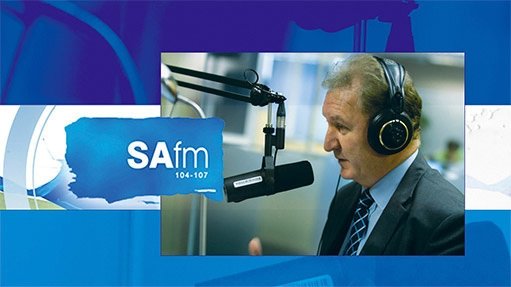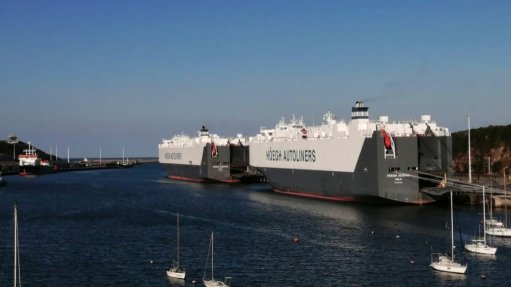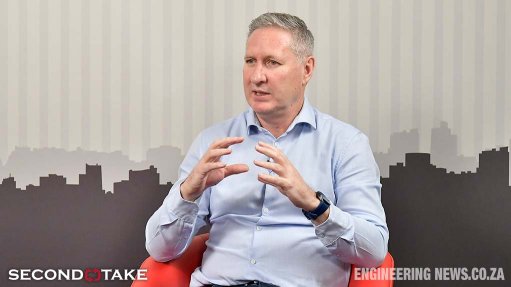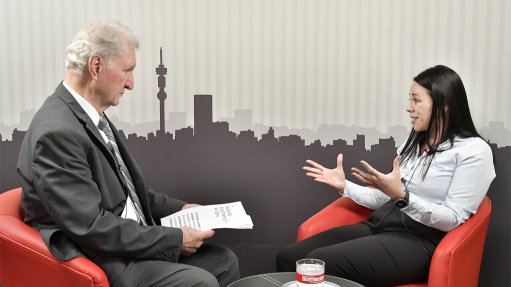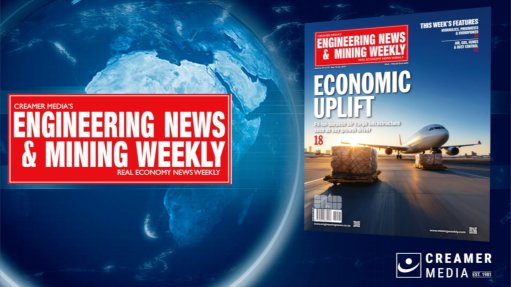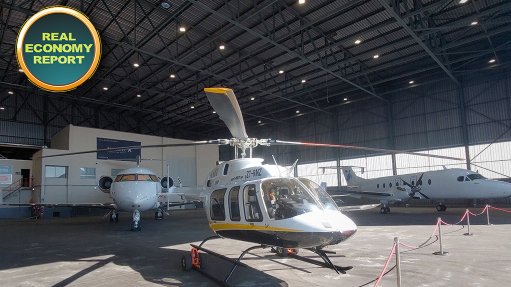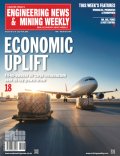Thungela speedy in putting R6m into trust for communities around its coal mines

Thungela CEO July Ndlovu interviewed by Mining Weekly’s Martin Creamer. Video: Darlene Creamer.
JOHANNESBURG (miningweekly.com) – With the new Thungela Resources only months old, the JSE- and London-listed coal mining company has already put an initial R6-million into a trust for the benefit of the communities living around its coal mining operations.
The first distribution to the Community Partnership Plan was made on June 30. Trustees have been appointed and plans are under way to appoint an administrator to ensure the trust delivers on its mandate. (Also watch attached Creamer Media video.)
Thungela’s Employee and Community Partnership empowerment transactions involve communities receiving a 5% fully funded interest in Thungela’s coal operations, and employees holding the same percentage. Collectively, this currently equates to some R680-million between employees and communities.
Thungela CEO July Ndlovu also revealed to Mining Weekly in a Teams interview that the new thermal coal company is:
- strongly committed to working with the coal value chain on carbon capture, utilisation and storage (CCUS) realisation;
- reducing its own Scope 1 and 2 emissions through solar powering offices and buildings, and improving the efficiencies of diesel consumption at its opencast coal mines;
- applying its mind on how best to exert influence at the Scope 3 emissions level;
- treating mine polluted water not only for reuse at its mines, but also for the benefit of the townsfolk of eMalahleni; and
- returning land to its previous state or sustainable use, which has included bringing back a rare species to a restored wetland as a world first.
On CCUS and the reuse of captured carbon dioxide (CO2), Ndlovu – who is also chairperson of the World Coal Association – said just as recycling has become a global must, the coal value chain must go all out to arrive at being able to capture CO2 and reuse it competitively for the benefit of society.
Mining Weekly: Why has Thungela established its employee and community partnership plans?
Ndlovu: It starts off with our purpose statement when we say we want to create value together for a shared future. A shared future implies, by its very nature, that there is something that you share. You can’t share the future unless you are sharing the value that you create as the entity and therefore we’ve got a responsibility to do that. But also it's a moral question of how to ensure that those affected by our mining activities benefit in a meaningful way from the mining activities that we carry out. From that context, we decided that there were things that we generally could do in a way that employees and communities share in the destiny of our business. That’s where the idea of these community partnership plans came from.
What does the 5% fully funded interest in Thungela’s coal operations currently amount to in monetary terms?
You can take your calculator and work it out, but here’s the point. We say that in the South African coal operations, if you recall, our corporate structure Thungela is 100% of our South African coal operations. As things stand today, 100% of Thungela equates to 100% of our coal operations, including that 10% owned by the other people. So if you just take our market cap and you say 10% of that belongs to employees and communities, you would be able to say what its monetary value is. As of today, I think our market cap is roughly R6.8-billion, so that should equate to about R680-million between those two.
What constitutes the community and how are you obviating the risk of not leaving any community members out? Have you worked that out quite well?
As well as we can, working with our partners in government, civil society and, quite frankly, our employees who understand who the communities around our mines are. So, yes, we have worked very hard at identifying who those communities are. These are the people in and around our mines, and again we’ve worked with government, not just the regulator but the local municipalities, to make sure that we, as best as we can, include everybody who is affected by our mining operations.
Well done on the S for social in the ESG but what contribution do you make to the E for environment?
The E is probably the one usually least spoken about. I saw one of your questions was on water. You know as well as I do that water is a big issue in the coal mining basin. We have got a flagship water treatment plant where we pump water from our own mines, clean that water to drinkable quality, and some of that water we reuse in our mines, but some of it we also supply to the town of eMalahleni. We think that’s an important environmental contribution in terms of cleaning water that is polluted. But equally, an important social contribution in terms of providing water in a country that is water staved. We have comprehensive programmes around what we do with returning land to its previous or sustainable use in terms of how we close, we reshape, and we reseed. We’ve done some really interesting projects like, for instance, where we’ve restored wetlands in different places. In fact, on one of our mines, Isibonelo, we did a project restoring a wetland and bringing back to that wetland a rare species, which has been recognised and for which we’ve received wide acclaim as a world first.
Does Thungela believe in mining greenly and cleanly?
That’s an interesting question because what does green mean, because these terms mean different things to different people. If you mean being a responsible miner in terms of ensuring efficient uses of resources, such as energy, water and making sure that we reduce the footprint of our activities, absolutely. But quite often when people say to me do you mine greenly, I always ask what do you actually mean because it means different things to different people.
When I ask are you mining greenly, I mean those machines under there, are you envisaging that they will always be powered by diesel, for instance?
I need to take you down a coal mine because that will change your question because our automated and mechanised mining machines, continuous miners, are all electric. In fact, coal mining has got an interesting mining activity in the sense that there are very few diesel machines, other than machines that we use to transport people back and forth from the mining areas, but the core mining activities themselves are electric.
There are all sorts of activities on the go now that want to try and ensure that people mine at least at their end in a better way, or doesn’t this apply to coal mining?
Look, it applies to any mining activity but clearly coal mining is very different given its hazardous nature. Remember that in coal mining fire risk is probably one of the biggest risks you’ve got, and therefore, as you think about different energy sources, you’re always going to keep at the back of your mind whether this doesn't create a fire risk, and the regulations around introducing different technologies that provide a different risk profile to fire, are very strict, not just in South Africa but even globally.
What steps are you taking to reduce Scope 1, 2 and 3 emissions and by when?
I can talk to Scope 1 and 2. Scope 3 is a bit of a more challenging one because we’ve got lots of projects, providing offices and buildings with solar and improving the efficiencies of the diesel consumption on our openpit mines and so forth and so on. That’s all in Scope 1 and 2. Scope 3 is a little bit more challenging for us as Thungela in the short term. We sell our coal to one customer called Anglo American. I’d like to have a conversation with my customer on Scope 3 because all they are doing is on-selling to thousands of other people. At this point in time, to be quite honest, that’s something that we need to apply our mind to, on how we can exert influence beyond our single customer, but I couldn’t give you a number or an activity that we’re doing today.
So Thungela is a miner, not a marketer. You let other people do the marketing and the trading?
At the moment, yes, and it was part of our transition.
Do you think carbon capture and storage (CCS) will be meaningful and is it competitive?
There are two parts to your question and the answer is found in the most recent Intergovernmental Partnership on Climate Change (IPCC) that was issued a few days ago, because in that report they do say – after we’ve done all these things, which include, by the way, getting rid of coal – there is one thing that we cannot escape, to manage global warming. We need to invest in technologies that remove CO2 from the atmosphere, and these technologies include carbon capture, sequestration and use. For us to meet our climate change objectives, we need CCUS (carbon capture, utilisation and storage). Fact. Not my conclusions, but the IPCC conclusions. Your question is whether this technology is competitive or not. None of these technologies, when they started, whether it is solar or wind, were competitive. They were driven by policy, and therefore if policy seeks to be agnostic to technologies to drive climate change, there is no reason why in the long term CCUS can’t be competitive.
From your point of view, you sell the coal and those who burn it should be looking at carbon capture and storage and you believe that they are going to have to come to some sort of competitive situation with that. It’s going to be essential.
The answer to that is slightly more nuanced than how you put it. I sometimes call it a winner/loser discussion which says that I dig so I do the winning, you’re burning so it’s your problem. But actually this is similar to this conversation that if you read adequately on the Johnson & Johnson settlement on opioid, you could not argue that people misuse what we produce and it is not our problem. Society no longer accepts that. We’ve got to act in a joint fashion and act responsibly as the value chain rather that as discreet parts of the value chain. So I’m just as invested in CCUS work as the ultimate customer, and we’re going to have to work together because it’s in our interests.
Do I hear you saying CCUS and I’m saying CCS? Is there something that I don’t know here?
So, you’re talking carbon capture, sequestration.
I’m talking carbon capture and storage?
Yes, the words sequestration and storage are one and the same thing. But actually the innovation has moved beyond just that to ‘can we use the CO2, once we’ve captured it’? So, it’s that combination of the technologies – you capture it, you store it. But can you use it to the benefit of society? I think just like we think about recycling materials, that’s where innovation has to go. So, it’s less about CCS but actually CCUS.
Comments
Press Office
Announcements
What's On
Subscribe to improve your user experience...
Option 1 (equivalent of R125 a month):
Receive a weekly copy of Creamer Media's Engineering News & Mining Weekly magazine
(print copy for those in South Africa and e-magazine for those outside of South Africa)
Receive daily email newsletters
Access to full search results
Access archive of magazine back copies
Access to Projects in Progress
Access to ONE Research Report of your choice in PDF format
Option 2 (equivalent of R375 a month):
All benefits from Option 1
PLUS
Access to Creamer Media's Research Channel Africa for ALL Research Reports, in PDF format, on various industrial and mining sectors
including Electricity; Water; Energy Transition; Hydrogen; Roads, Rail and Ports; Coal; Gold; Platinum; Battery Metals; etc.
Already a subscriber?
Forgotten your password?
Receive weekly copy of Creamer Media's Engineering News & Mining Weekly magazine (print copy for those in South Africa and e-magazine for those outside of South Africa)
➕
Recieve daily email newsletters
➕
Access to full search results
➕
Access archive of magazine back copies
➕
Access to Projects in Progress
➕
Access to ONE Research Report of your choice in PDF format
RESEARCH CHANNEL AFRICA
R4500 (equivalent of R375 a month)
SUBSCRIBEAll benefits from Option 1
➕
Access to Creamer Media's Research Channel Africa for ALL Research Reports on various industrial and mining sectors, in PDF format, including on:
Electricity
➕
Water
➕
Energy Transition
➕
Hydrogen
➕
Roads, Rail and Ports
➕
Coal
➕
Gold
➕
Platinum
➕
Battery Metals
➕
etc.
Receive all benefits from Option 1 or Option 2 delivered to numerous people at your company
➕
Multiple User names and Passwords for simultaneous log-ins
➕
Intranet integration access to all in your organisation


